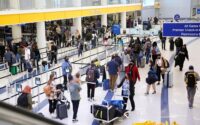NYC hotels, rentals must require travelers to fill out form
Hotels and short-term rentals in New York City are now required to make out-of-state guests fill out a traveler form before giving them access to their rooms, to ensure that they quarantine if warranted.
Mayor Bill de Blasio on Tuesday signed an executive order requiring the traveler health forms be completed by people coming from states on the restricted list during the coronavirus pandemic.
“If they don’t have that form from the traveler, they should not give them access to that room, period,” de Blasio said at his daily press briefing.
A 14-day quarantine is mandatory for travelers from the state’s travel advisory list, which includes 32 states and two US territories.
New York City Sheriff Joseph Fucito warned that travelers who refuse to fill out the form could be charged with a class B misdemeanor — or face civil commitment, penalties and fines.
“Noncompliance … is a crime,” he said.
He later said scofflaws could be committed to a hospital, by court order, until quarantine is complete.
De Blasio also asked all New Yorkers to refrain from traveling to states seeking spikes in COVID-19 infections.
“If you have a choice in travel, don’t go where the problem is,” he said.
Fifteen to 20 percent of new coronavirus cases in the city have been recorded among people who recently traveled out of state, according to Dr. Jay Varma, the mayor’s senior health adviser.
New York marked its 11th straight day of a positive coronavirus infection rate less than one percent, with 66,891 tests conducted and 655 positive test results. Eight deaths were also reported.
New York City’s rate was slightly higher, at 1.1 percent, according to Monday’s data.

On Tuesday, Alaska and Delaware were added onto New York State’s travel advisory list.
The list includes: Alaska, Alabama, Arkansas, Arizona, California, Delaware, Florida, Georgia, Hawaii, Iowa, Idaho, Illinois, Indiana, Kansas, Kentucky, Louisiana, Maryland, Minnesota, Missouri, Mississippi, Montana, North Carolina, North Dakota, Nebraska, Nevada, Oklahoma, Puerto Rico, South Carolina, South Dakota, Tennessee, Texas, Utah, Virginia, Virgin Islands and Wisconsin.
States get added if virus data shows a positive coronavirus test rate higher than 10 per 10,000 residents over a seven-day rolling average, or a 10 percent or higher positivity rate over the same period. Those metrics were established by the state Department of Health.


